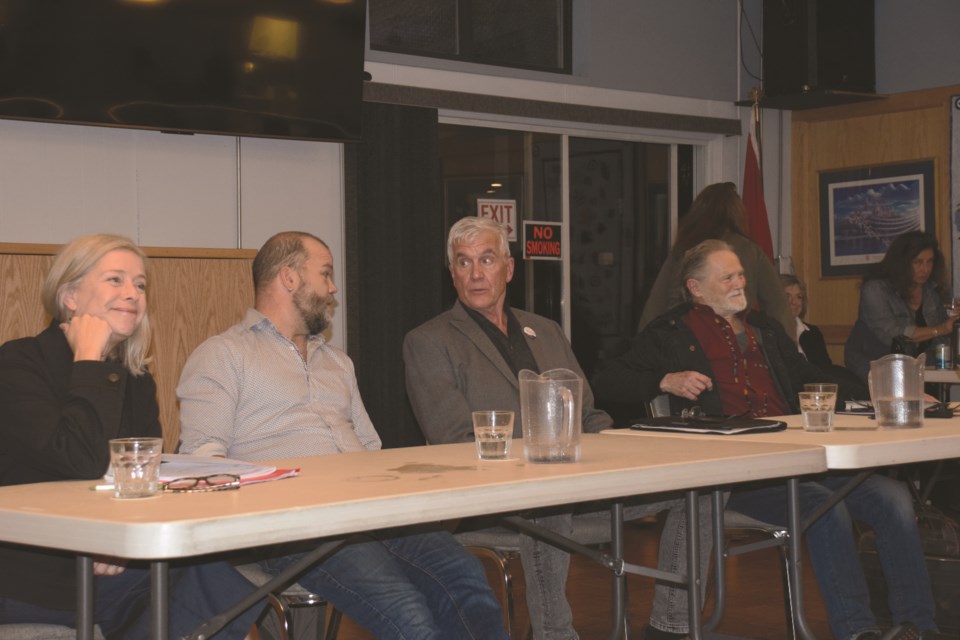A capacity crowd and an overflowing Pender Harbour Legion parking lot greeted the four hopefuls vying for the Powell River-Sunshine Coast riding’s seat in the provincial legislature on Oct. 8. An all candidates debate sponsored by the Pender Harbour and Area Residents Association (PHARA) culminated with more discourse between candidates and audience members than among those running for office.
Questions posed to the candidates by event moderator Peter Robson of the PHARA board and individuals that took to the microphone touched on issues ranging from health care to housing and local road conditions. About half of the inquiries focused on the swiya-wide Dock Management Plan (DMP) and the province’s Declaration of the Rights of Indigenous People’s Act (DRIPA).
The candidates were introduced and provided opening statements based on the number of seats held by their party in the most recent legislative session, starting with the New Democratic Party’s (NDP) Randene Neill. The former Global BC television journalist and four-year full-time Pender Harbour area resident launched her presentation, noting that her brief tenure in the community and inability to win (despite numerous entries) the area’s annual April Tools Wooden Boat building competition, meant, in her view, she was not yet a “local."
In her response to a question posed to each of the candidates on DRIPA, Neill explained that B.C. is the first Canadian jurisdiction to enact this type of shared decision-making model. “It’s new," she said stating that she understands that the change is frightening and confusing for many. She stated she would encourage more conversations in the community on the Act and would ensure the voices of the people of the riding are heard in its implementation.
Next at the microphone was the Green Party’s Chris Hergesheimer. Projecting energy and passion, his opening statement about his run to become the area’s MLA was that he wanted the job “so badly” in order to facilitate change. He spoke of his experiences living and working on the lower Sunshine Coast, which included having his family “reno-victed” from rental housing. “We can do better” was his view of how many provincial programs are being delivered, including efforts related to DRIPA.
When Chris Moore of the BC Conservative’s took to the podium, his introductory remarks reflected on his background in housing development, emergency services and small business, then moved to his concerns for the local and provincial economy. Citing “19 years of NDP mismanagement” (it was 2007 when the NDP most recently came into power provincially), he called on those gathered to elect a Conservative government not only on Oct. 19, but also in the next four year term, as he anticipated it will take two terms to correct the province's course and regain lost ground. He stated he would prefer to see issues related to First Nations reconciliation resolved through longer established parliamentary processes rather than DRIPA, noting that reconciliation has to be a “two-way street."
The opening presentations wrapped up with words from independent candidate Greg Reid. He spoke of his background on both the lower Sunshine Coast and in his current community of Powell River, adding in a reference back to a run for secondary school student council in Ontario. Focusing on his lack of a political party affiliation, his pitch was, if elected, “I would give you the opportunity to vote on every issue." He proposed a direct democracy system, where using technology he would canvas constituents for their opinions, then vote per their will in the legislature. He did not offer his own views on DRIPA, but noted he also supported a “two way street” approach to First Nations reconciliation.
After a short break, written submissions and questions from those in attendance were fielded. The live audience inquiries skewed towards issues related to the DMP, one asking the candidates whether they would support continuation of the work of the advisory committee on that matter.
“I can commit to that," was the response from Reid, noting such citizen advisory groups were a demonstration of the “direct democracy” approach he advocates for.
Moore’s response was that he could support it, if it leads to a greater “level of certainty” for the community and impacted property owners.
Neill said she supported allowing the advisory group work to continue, citing it as a mechanism to “build trust” in the DMP process.
A question was posed by a member of the audience who indicated he had been required to remove his dock under the DMP. He asked the candidates if they would “invest in” proper scientific studies on the impact of docks “based on true science” rather than the desktop studies that previous iterations of the DMP, dating back 20 years, had relied on.
Responses came from Moore and Neill, with the Conservative supporting more investment in studies and “taking the time to do it right." Neill questioned whether the community really wanted “to go back 20 years." That comment elicited multiple shout outs from the audience including “Let’s do it."
Inquiries into possible privatization of health care services under the Conservatives resulted in a verbal tussle between a member of the public and Moore. In that, the candidate asserted that his party’s plan was not to replace public health care but to temporarily augment it with private services until the health care system can be re-built to an acceptable level.
When it came to discussion on fixing the declining quality of local roads, Hergesheimer said he believed this type of service should be considered “low hanging fruit” for governments and should be a priority. In his view, when “little things” like road repairs are done that “builds trust” and restores faith in local democracy. “Some one has to get it done…and I will get it done,” he stated.
The meeting lasted almost two and a half hours. Coast Reporter witnessed only a handful of people leaving the hall before the session was adjourned.



